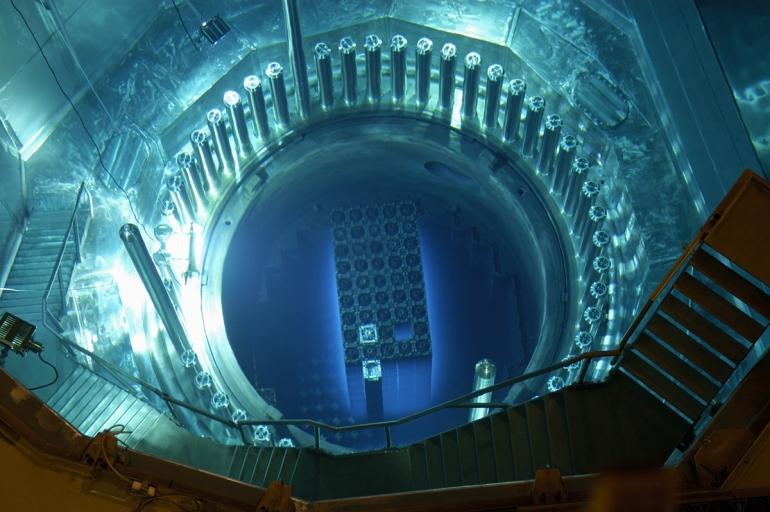[caption id="attachment_358483" align="aligncenter" width="392" caption="photos.zl3.me"][/caption]
Probably most people picture the iconic cooling tower when the subject of nuclear power comes up. Its actual function is to get rid of waste heat by means of cooling down running water through natural draft. The vital procedures happen in the reactor. Nuclear power is no different from other types of energy when it comes to heating up water to produce steam that travels through a turbine generating electricity from mechanical energy.
Nuclear power is different in the way that it produces no air pollution. In the reactor uranium-235 in the form of ceramic pellets is bombarded by neutrons turning it into unstable uranium-236 which breaks down into lighter non radioactive elements. The process is called fission and produces a large amount of energy as a byproduct.
Sometimes however, the uranium absorbs the neutron but doesn’t fission. Instead it turns it into a heavier element which can absorb another neutron creating a transuranic which are, “Chemical elements with atomic numbers greater than 92”-wikipedia, to later become nuclear waste which can take thousands of years to decay. “To maintain efficient reactor performance, about one-third or half of the used fuel is removed every year or two, to be replaced with fresh fuel” -world-nuclear.org, the waste is ridden and the cycle continues.
[caption id="" align="aligncenter" width="430" caption="www.reddit.com"]

For nuclear fission to become a worldwide source of power there must be a protected place to contain the waste as there are many uncertainties such as possible volcano eruptions and earthquakes if buried underground. Transportation of waste if handled improperly could be disastrous, as is the idea of sending waste into space. France has begun to recycle its radioactive waste to be used again a second time as waste surprisingly has 90% uranium.
“From 1946 through 1993, thirteen countries used ocean disposal or ocean dumping as a method to dispose of nuclear/radioactive waste.” wikipedia.org, fortunately those days are gone from recent international agreements.
Many are skeptical to nuclear power plants after the Chernobyl accident, Fukushima Japan meltdown and the Three Mile Island incident. The world’s worst, Chernobyl led to 55 direct deaths and spread cancer to large parts of Europe, plus a permanent exclusion zone of 30km preventing anyone from stepping near its vicinity ever again. Nuclear power plants are also an open target for possible military attacks, e.g Operation Opera in 1981. 14,500 cumulative reactor-years of commercial operation in 32 countries wish to prevent another onslaught. And modern licensing makes sure that any new nuclear plant must be approved that if a meltdown did occur its effects would be confined inside and not spread to the environment.
“Fukushima with a triple meltdown causing no fatalities or serious radiation doses to anyone, while over two hundred people continued working on the site to mitigate the accident's effects.”- world-nuclear.org
It is also safe to say that a nuclear plant will not explode like a nuclear bomb because “the fuel is not enriched beyond about 5%,” world-nuclear.org . A example scenario of a meltdown would be the uranium reaching prompt criticality producing huge amounts of energy/heat in milliseconds. If the heat can’t be displaced fast enough there will be a meltdown. Prompt crit can be avoided by placing cooling rods (silver, indium or cadmium, absorbs the excess neutrons) that react precisely whether or not there is electricity to avoid another Fukushima.
Hopefully this will improve the views placed on nuclear plants to possibly replace fossil fuels forever, leading to a non-pollutant environment.
http://en.wikipedia.org/wiki/Control_rod
http://abcnews.go.com/Technology/story?id=98555
http://en.wikipedia.org/wiki/Ocean_disposal_of_radioactive_waste
http://en.wikipedia.org/wiki/Radioactive_waste#Management_of_waste
http://en.wikipedia.org/wiki/Radioactive_waste
http://www.whatisnuclear.com/articles/waste.html
http://en.wikipedia.org/wiki/Cooling_tower
http://en.wikipedia.org/wiki/Nuclear_fission
http://www.world-nuclear.org/Nuclear-Basics/How-does-a-nuclear-reactor-make-electricity-/
http://boards.straightdope.com/sdmb/showthread.php?t=544300
http://en.wikipedia.org/wiki/Operation_Opera
Baca konten-konten menarik Kompasiana langsung dari smartphone kamu. Follow channel WhatsApp Kompasiana sekarang di sini: https://whatsapp.com/channel/0029VaYjYaL4Spk7WflFYJ2H









